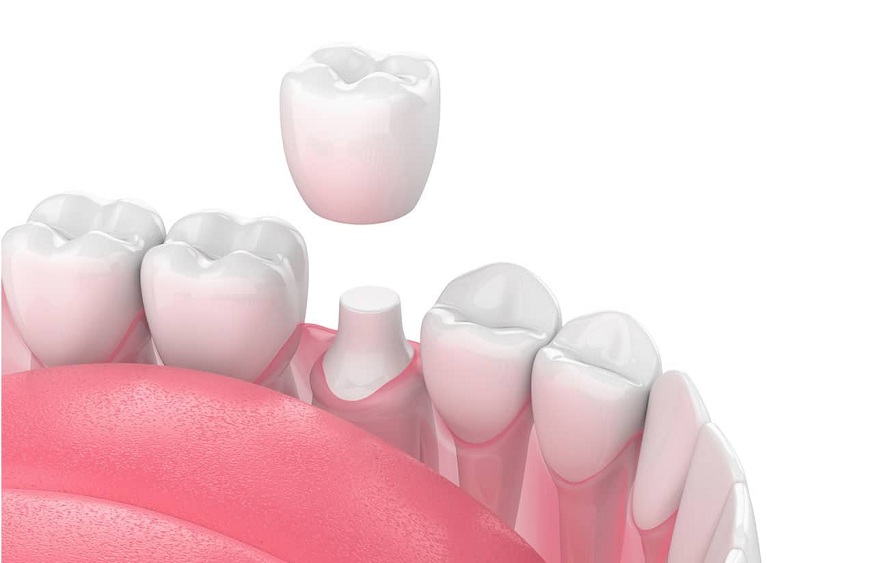A root canal is a dental procedure that is performed to treat an infected or inflamed tooth.
During the procedure, the infected or inflamed pulp inside the tooth is removed, and the tooth is cleaned and sealed.
In some cases, a crown may be placed on the tooth after the root canal procedure is completed.
A crown is a cap that is placed over a damaged or decayed tooth to restore its shape, size, and strength.
The crown is designed to look and function like a natural tooth and is usually made from porcelain, ceramic, or metal.
If a crown is not placed on a tooth after a root canal procedure, it can have several possible effects on the tooth and the surrounding teeth.
1. Increased Risk of Fracture
When the pulp of a tooth is removed during a root canal treatment, the tooth becomes weaker and more brittle.
Without a crown, the tooth is more susceptible to fracture, especially if it is a back molar that is subject to the pressure of chewing.
2. Risk of Re-infection
A crown helps to protect the tooth from further infection by sealing it off from bacteria and other harmful substances.
If a crown is not placed on the tooth after a root canal, there is a higher risk of re-infection, which can cause pain, swelling, and the need for further treatment.
3. Weakening of Surrounding Teeth
When a tooth is damaged or decayed, it can cause the surrounding teeth to shift and become unstable.
Without a crown to support the tooth, the surrounding teeth can become weakened and more susceptible to damage.
4. Cosmetic Issues
A tooth that has undergone a root canal procedure can become discolored over time. A crown can help to restore the appearance of the tooth and prevent it from standing out from the surrounding teeth.
Without a crown, the tooth may appear darker or discolored, which can be a cosmetic issue for some people.
5. Decreased Longevity
A tooth that has undergone a root canal procedure without a crown is more likely to fail or require further treatment. This can result in additional time, expense, and discomfort for the patient.
6. Sensitivity to Temperature and Pressure
A tooth that has undergone a root canal procedure may be more sensitive to temperature and pressure.
Without a crown, the tooth may be more susceptible to hot or cold foods and drinks, as well as pressure from chewing.
This sensitivity can cause discomfort or pain and may make it difficult to eat or drink certain foods.
7. Bite Misalignment
A missing or damaged tooth can cause problems with the alignment of your bite. If a crown is not placed on the tooth after a root canal, it can affect your bite, causing discomfort or pain when you chew or speak.
In severe cases, it can even lead to temporomandibular joint (TMJ) disorder, a condition that causes pain and discomfort in the jaw.
8. Increased Risk of Tooth Loss
If a tooth that has undergone a root canal procedure is not restored with a crown, it may eventually become too weak to support itself, which can result in tooth loss.
This can be a significant problem, as missing teeth can cause further dental problems and can affect the appearance of your smile.
9. Difficulty with Speech
A missing or damaged tooth can affect your speech, making it difficult to pronounce certain words or sounds.
This can cause embarrassment or frustration and may affect your confidence in social situations.
10. Increased Cost in the Long Run
If a crown is not placed on a tooth after a root canal procedure, there is a higher chance of the tooth becoming re-infected, which can lead to the need for further treatment. This can result in additional costs for the patient in terms of time, money, and discomfort.
11. Difficulty Eating and Digestion Problems
If a tooth is missing or damaged, it can make it difficult to chew food properly, which can lead to digestive problems.
In severe cases, it can even lead to malnutrition, which can have a negative impact on your overall health.
12. Reduced Self-Esteem
Missing or damaged teeth can have a negative impact on your self-esteem and confidence.
It can make you feel self-conscious about your appearance and affect your social interactions, leading to feelings of isolation and depression.
13. Increased Risk of Gum Disease
If a tooth is missing or damaged, it can affect the health of the surrounding gum tissue.
Without a crown, the gum tissue around the tooth may become inflamed or infected, which can lead to gum disease.
14. Difficulty Maintaining Oral Hygiene
A missing or damaged tooth can make it difficult to maintain proper oral hygiene. Without a crown, the tooth may be more difficult to brush and floss properly, which can lead to plaque buildup and gum disease.
15. Jawbone Deterioration
When a tooth is missing, the jawbone in that area can begin to deteriorate over time. This can affect the structure of your face and make it more difficult to receive dental implants or other restorative dental procedures in the future.
16. Increased Risk of Infection
If a tooth is left untreated without a crown after a root canal procedure, it can lead to an increased risk of infection in the surrounding teeth and gums.
This can cause pain, swelling, and discomfort, and may require further treatment to resolve.
17. Difficulty with Dental Work in the Future
If a tooth is left untreated without a dental crown after a root canal procedure, it can make it more difficult to perform dental work in the future.
This can be a problem if you need other dental procedures, such as fillings, implants, or bridges.
18. Limited Food Choices
If a tooth is missing or damaged, it can make it difficult to eat certain foods, which can limit your diet and affect your nutrition.
This can be particularly problematic for those who have specific dietary needs or restrictions.
Final words
If a crown is not placed on a tooth after a root canal procedure, it can have several possible effects on the tooth and the surrounding teeth.
These include an increased risk of fracture, re-infection, weakening of surrounding teeth, cosmetic issues, and decreased longevity.
If you have had a root canal procedure, it is important to follow your dentist’s for crown root canal treatment in Singapore and have a crown placed on the tooth to ensure the best possible outcome.

